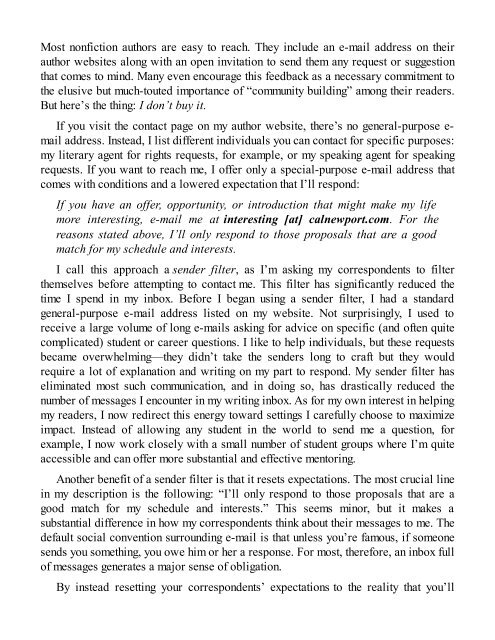Deep Work_ Rules for focused success in a distracted world ( PDFDrive.com )
You also want an ePaper? Increase the reach of your titles
YUMPU automatically turns print PDFs into web optimized ePapers that Google loves.
Most nonfiction authors are easy to reach. They <strong>in</strong>clude an e-mail address on their<br />
author websites along with an open <strong>in</strong>vitation to send them any request or suggestion<br />
that <strong>com</strong>es to m<strong>in</strong>d. Many even encourage this feedback as a necessary <strong>com</strong>mitment to<br />
the elusive but much-touted importance of “<strong>com</strong>munity build<strong>in</strong>g” among their readers.<br />
But here’s the th<strong>in</strong>g: I don’t buy it.<br />
If you visit the contact page on my author website, there’s no general-purpose e-<br />
mail address. Instead, I list different <strong>in</strong>dividuals you can contact <strong>for</strong> specific purposes:<br />
my literary agent <strong>for</strong> rights requests, <strong>for</strong> example, or my speak<strong>in</strong>g agent <strong>for</strong> speak<strong>in</strong>g<br />
requests. If you want to reach me, I offer only a special-purpose e-mail address that<br />
<strong>com</strong>es with conditions and a lowered expectation that I’ll respond:<br />
If you have an offer, opportunity, or <strong>in</strong>troduction that might make my life<br />
more <strong>in</strong>terest<strong>in</strong>g, e-mail me at <strong>in</strong>terest<strong>in</strong>g [at] calnewport.<strong>com</strong>. For the<br />
reasons stated above, I’ll only respond to those proposals that are a good<br />
match <strong>for</strong> my schedule and <strong>in</strong>terests.<br />
I call this approach a sender filter, as I’m ask<strong>in</strong>g my correspondents to filter<br />
themselves be<strong>for</strong>e attempt<strong>in</strong>g to contact me. This filter has significantly reduced the<br />
time I spend <strong>in</strong> my <strong>in</strong>box. Be<strong>for</strong>e I began us<strong>in</strong>g a sender filter, I had a standard<br />
general-purpose e-mail address listed on my website. Not surpris<strong>in</strong>gly, I used to<br />
receive a large volume of long e-mails ask<strong>in</strong>g <strong>for</strong> advice on specific (and often quite<br />
<strong>com</strong>plicated) student or career questions. I like to help <strong>in</strong>dividuals, but these requests<br />
became overwhelm<strong>in</strong>g—they didn’t take the senders long to craft but they would<br />
require a lot of explanation and writ<strong>in</strong>g on my part to respond. My sender filter has<br />
elim<strong>in</strong>ated most such <strong>com</strong>munication, and <strong>in</strong> do<strong>in</strong>g so, has drastically reduced the<br />
number of messages I encounter <strong>in</strong> my writ<strong>in</strong>g <strong>in</strong>box. As <strong>for</strong> my own <strong>in</strong>terest <strong>in</strong> help<strong>in</strong>g<br />
my readers, I now redirect this energy toward sett<strong>in</strong>gs I carefully choose to maximize<br />
impact. Instead of allow<strong>in</strong>g any student <strong>in</strong> the <strong>world</strong> to send me a question, <strong>for</strong><br />
example, I now work closely with a small number of student groups where I’m quite<br />
accessible and can offer more substantial and effective mentor<strong>in</strong>g.<br />
Another benefit of a sender filter is that it resets expectations. The most crucial l<strong>in</strong>e<br />
<strong>in</strong> my description is the follow<strong>in</strong>g: “I’ll only respond to those proposals that are a<br />
good match <strong>for</strong> my schedule and <strong>in</strong>terests.” This seems m<strong>in</strong>or, but it makes a<br />
substantial difference <strong>in</strong> how my correspondents th<strong>in</strong>k about their messages to me. The<br />
default social convention surround<strong>in</strong>g e-mail is that unless you’re famous, if someone<br />
sends you someth<strong>in</strong>g, you owe him or her a response. For most, there<strong>for</strong>e, an <strong>in</strong>box full<br />
of messages generates a major sense of obligation.<br />
By <strong>in</strong>stead resett<strong>in</strong>g your correspondents’ expectations to the reality that you’ll



